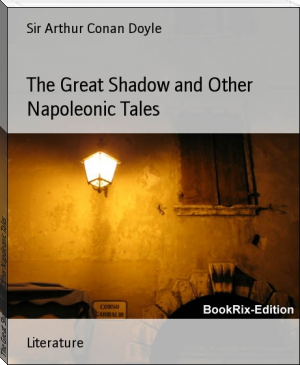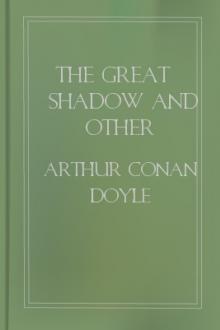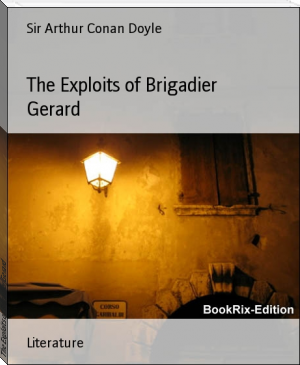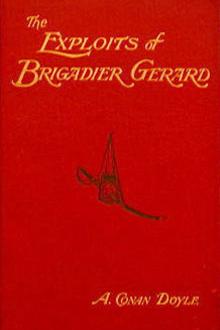The Great Shadow and Other Napoleonic Tales by Sir Arthur Conan Doyle (best memoirs of all time .TXT) 📕

- Author: Sir Arthur Conan Doyle
Book online «The Great Shadow and Other Napoleonic Tales by Sir Arthur Conan Doyle (best memoirs of all time .TXT) 📕». Author Sir Arthur Conan Doyle
degree, and he would come up to West Inch four nights a week to sit with us. My folk were pleased about it, and I tried to be pleased too.
Maybe at first there was a little coolness between him and me: there was not quite the old schoolboy trust between us. But then, when the first smart was passed, it seemed to me that he had acted openly, and that I had no just cause for complaint against him. So we were friendly, in a way; and as for her, he had forgotten all his anger, and would have kissed the print of her shoe in the mud. We used to take long rambles together, he and I; and it is about one of these that I now want to tell you.
We had passed over Bramston Heath and round the clump of firs which screens the house of Major Elliott from the sea wind. It was spring now, and the year was a forward one, so that the trees were well leaved by the end of April. It was as warm as a summer day, and we were the more surprised when we saw a huge fire roaring upon the grass-plot before the Major's door. There was half a fir-tree in it, and the flames were spouting up as high as the bedroom windows. Jim and I stood staring, but we stared the more when out came the Major, with a great quart pot in his hand, and at his heels his old sister who kept house for him, and two of the maids, and all four began capering about round the fire. He was a douce, quiet man, as all the country knew, and here he was like old Nick at the carlin's dance, hobbling around and waving his drink above his head. We both set off running, and he waved the more when he saw us coming.
"Peace!" he roared. "Huzza, boys! Peace!"
And at that we both fell to dancing and shouting too; for it had been such a weary war as far back as we could remember, and the shadow had lain so long over us, that it was wondrous to feel that it was lifted. Indeed it was too much to believe, but the Major laughed our doubts to scorn.
"Aye, aye, it is true," he cried, stopping with his hand to his side. "The Allies have got Paris, Boney has thrown up the sponge, and his people are all swearing allegiance to Louis XVIII."
"And the Emperor?" I asked. "Will they spare him?"
"There's talk of sending him to Elba, where he'll be out of mischief's way. But his officers, there are some of them who will not get off so lightly. Deeds have been done during these last twenty years that have not been forgotten. There are a few old scores to be settled. But it's Peace! Peace!"
And away he went once more with his great tankard hopping round his bonfire.
Well, we stayed some time with the Major, and then away we went down to the beach, Jim and I, talking about this great news, and all that would come of it. He knew a little, and I knew less, but we pieced it all together and talked about how the prices would come down, how our brave fellows would return home, how the ships could go where they would in peace, and how we could pull all the coast beacons down, for there was no enemy now to fear. So we chatted as we walked along the clean, hard sand, and looked out at the old North Sea. How little did Jim know at that moment, as he strode along by my side so full of health and of spirits, that he had reached the extreme summit of his life, and that from that hour all would, in truth, be upon the downward slope!
There was a little haze out to sea; for it had been very misty in the early morning, though the sun had thinned it. As we looked seawards we suddenly saw the sail of a small boat break out through the fog, and come bobbing along towards the land. A single man was seated in the sheets, and she yawed about as she ran, as though he were of two minds whether to beach her or no. At last, determined it may be by our presence, he made straight for us, and her keel grated upon the shingle at our very feet. He dropped his sail, sprang out, and pulled her bows up on the beach.
"Great Britain, I believe?" said he, turning briskly round and facing us.
He was a man somewhat above middle height, but exceedingly thin. His eyes were piercing and set close together, a long sharp nose jutted out from between them, and beneath them was a bristle of brown moustache as wiry and stiff as a cat's whiskers. He was well dressed in a suit of brown with brass buttons, and he wore high boots which were all roughened and dulled by the sea water. His face and hands were so dark that he might have been a Spaniard, but as he raised his hat to us we saw that the upper part of his brow was quite white and that it was from without that he had his swarthiness. He looked from one to the other of us, and his grey eyes had something in them which I had never seen before. You could read the question; but there seemed to be a menace at the back of it, as if the answer were a right and not a favour.
"Great Britain?" he asked again, with a quick tap of his foot on the shingle.
"Yes," said I, while Jim burst out laughing.
"England? Scotland?"
"Scotland. But it's England past yonder trees."
"_Bon!_ I know where I am now. I've been in a fog without a compass for nearly three days, and I didn't thought I was ever to see land again."
He spoke English glibly enough, but with some strange turn of speech from time to time.
"Where did you come from then?" asked Jim.
"I was in a ship that was wrecked," said he shortly. "What is the town down yonder?"
"It is Berwick."
"Ah! well, I must get stronger before I can go further."
He turned towards the boat, and as he did so he gave a lurch, and would have fallen had he not caught the prow. On this he seated himself and looked round with a face that was flushed, and two eyes that blazed like a wild beast's.
"_Voltigeurs de la Garde_," he roared in a voice like a trumpet call, and then again "_Voltigeurs de la Garde!_"
He waved his hat above is head, and suddenly pitching forwards upon his face on the sand, he lay all huddled into a little brown heap.
Jim Horscroft and I stood and stared at each other. The coming of the man had been so strange, and his questions, and now this sudden turn. We took him by a shoulder each and turned him upon his back. There he lay with his jutting nose and his cat's whiskers, but his lips were bloodless, and his breath would scarce shake a feather.
"He's dying, Jim!" I cried.
"Aye, for want of food and water. There's not a drop or crumb in the boat. Maybe there's something in the bag."
He sprang and brought out a black leather bag, which with a large blue coat was the only thing in the boat. It was locked, but Jim had it open in an instant. It was half full of gold pieces.
Neither of us had ever seen so much before--no, nor a tenth part of it. There must have been hundreds of them, all bright new British sovereigns. Indeed, so taken up were we that we had forgotten all about their owner until a groan took our thoughts back to him. His lips were bluer than ever, and his jaw had dropped. I can see his open mouth now, with its row of white wolfish teeth.
"My God, he's off!" cried Jim. "Here, run to the burn. Jock, for a hatful of water. Quick, man, or he's gone! I'll loosen his things the while." Away I tore, and was back in a minute with as much water as would Stay in my Glengarry. Jim had pulled open the man's coat and shirt, and we doused the water over him, and forced some between his lips. It had a good effect; for after a gasp or two he sat up and rubbed his eyes slowly, like a man who is waking from a deep sleep. But neither Jim nor I were looking at his face now, for our eyes were fixed upon his uncovered chest.
There were two deep red puckers in it, one just below the collar bone, and the other about half-way down on the right side. The skin of his body was extremely white up to the brown line of his neck, and the angry crinkled spots looked the more vivid against it. From above I could see that there was a corresponding pucker in the back at one place, but not at the other. Inexperienced as I was, I could tell what that meant. Two bullets had pierced his chest; one had passed through it, and the other had remained inside.
But suddenly he staggered up to his feet, and pulled his shirt to, with a quick suspicious glance at us.
"What have I been doing?" he asked. "I've been off my head. Take no notice of anything I may have said. Have I been shouting?"
"You shouted just before you fell."
"What did I shout?"
I told him, though it bore little meaning to my mind. He looked sharply at us, and then he shrugged his shoulders.
"It's the words of a song," said he. "Well, the question is, What am I to do now? I didn't thought I was so weak. Where did you get the water?"
I pointed towards the burn, and he staggered off to the bank. There he lay down upon his face, and he drank until I thought he would never have done. His long skinny neck was outstretched like a horse's, and he made a loud supping noise with his lips. At last he got up with a long sigh, and wiped his moustache with his sleeve.
"That's better," said he. "Have you any food?"
I had crammed two bits of oat-cake into my pocket when I left home, and these he crushed into his mouth and swallowed. Then he squared his shoulders, puffed out his chest, and patted his ribs with the flat of his hands.
"I am sure that I owe you exceedingly well," said he. "You have been very kind to a stranger. But I see that you have had occasion to open my bag."
"We hoped that we might find wine or brandy there when you fainted."
"Ah! I have nothing there but just a little--how do you say it?--my savings. They are not much, but I must live quietly upon them until I find something to do. Now one
Maybe at first there was a little coolness between him and me: there was not quite the old schoolboy trust between us. But then, when the first smart was passed, it seemed to me that he had acted openly, and that I had no just cause for complaint against him. So we were friendly, in a way; and as for her, he had forgotten all his anger, and would have kissed the print of her shoe in the mud. We used to take long rambles together, he and I; and it is about one of these that I now want to tell you.
We had passed over Bramston Heath and round the clump of firs which screens the house of Major Elliott from the sea wind. It was spring now, and the year was a forward one, so that the trees were well leaved by the end of April. It was as warm as a summer day, and we were the more surprised when we saw a huge fire roaring upon the grass-plot before the Major's door. There was half a fir-tree in it, and the flames were spouting up as high as the bedroom windows. Jim and I stood staring, but we stared the more when out came the Major, with a great quart pot in his hand, and at his heels his old sister who kept house for him, and two of the maids, and all four began capering about round the fire. He was a douce, quiet man, as all the country knew, and here he was like old Nick at the carlin's dance, hobbling around and waving his drink above his head. We both set off running, and he waved the more when he saw us coming.
"Peace!" he roared. "Huzza, boys! Peace!"
And at that we both fell to dancing and shouting too; for it had been such a weary war as far back as we could remember, and the shadow had lain so long over us, that it was wondrous to feel that it was lifted. Indeed it was too much to believe, but the Major laughed our doubts to scorn.
"Aye, aye, it is true," he cried, stopping with his hand to his side. "The Allies have got Paris, Boney has thrown up the sponge, and his people are all swearing allegiance to Louis XVIII."
"And the Emperor?" I asked. "Will they spare him?"
"There's talk of sending him to Elba, where he'll be out of mischief's way. But his officers, there are some of them who will not get off so lightly. Deeds have been done during these last twenty years that have not been forgotten. There are a few old scores to be settled. But it's Peace! Peace!"
And away he went once more with his great tankard hopping round his bonfire.
Well, we stayed some time with the Major, and then away we went down to the beach, Jim and I, talking about this great news, and all that would come of it. He knew a little, and I knew less, but we pieced it all together and talked about how the prices would come down, how our brave fellows would return home, how the ships could go where they would in peace, and how we could pull all the coast beacons down, for there was no enemy now to fear. So we chatted as we walked along the clean, hard sand, and looked out at the old North Sea. How little did Jim know at that moment, as he strode along by my side so full of health and of spirits, that he had reached the extreme summit of his life, and that from that hour all would, in truth, be upon the downward slope!
There was a little haze out to sea; for it had been very misty in the early morning, though the sun had thinned it. As we looked seawards we suddenly saw the sail of a small boat break out through the fog, and come bobbing along towards the land. A single man was seated in the sheets, and she yawed about as she ran, as though he were of two minds whether to beach her or no. At last, determined it may be by our presence, he made straight for us, and her keel grated upon the shingle at our very feet. He dropped his sail, sprang out, and pulled her bows up on the beach.
"Great Britain, I believe?" said he, turning briskly round and facing us.
He was a man somewhat above middle height, but exceedingly thin. His eyes were piercing and set close together, a long sharp nose jutted out from between them, and beneath them was a bristle of brown moustache as wiry and stiff as a cat's whiskers. He was well dressed in a suit of brown with brass buttons, and he wore high boots which were all roughened and dulled by the sea water. His face and hands were so dark that he might have been a Spaniard, but as he raised his hat to us we saw that the upper part of his brow was quite white and that it was from without that he had his swarthiness. He looked from one to the other of us, and his grey eyes had something in them which I had never seen before. You could read the question; but there seemed to be a menace at the back of it, as if the answer were a right and not a favour.
"Great Britain?" he asked again, with a quick tap of his foot on the shingle.
"Yes," said I, while Jim burst out laughing.
"England? Scotland?"
"Scotland. But it's England past yonder trees."
"_Bon!_ I know where I am now. I've been in a fog without a compass for nearly three days, and I didn't thought I was ever to see land again."
He spoke English glibly enough, but with some strange turn of speech from time to time.
"Where did you come from then?" asked Jim.
"I was in a ship that was wrecked," said he shortly. "What is the town down yonder?"
"It is Berwick."
"Ah! well, I must get stronger before I can go further."
He turned towards the boat, and as he did so he gave a lurch, and would have fallen had he not caught the prow. On this he seated himself and looked round with a face that was flushed, and two eyes that blazed like a wild beast's.
"_Voltigeurs de la Garde_," he roared in a voice like a trumpet call, and then again "_Voltigeurs de la Garde!_"
He waved his hat above is head, and suddenly pitching forwards upon his face on the sand, he lay all huddled into a little brown heap.
Jim Horscroft and I stood and stared at each other. The coming of the man had been so strange, and his questions, and now this sudden turn. We took him by a shoulder each and turned him upon his back. There he lay with his jutting nose and his cat's whiskers, but his lips were bloodless, and his breath would scarce shake a feather.
"He's dying, Jim!" I cried.
"Aye, for want of food and water. There's not a drop or crumb in the boat. Maybe there's something in the bag."
He sprang and brought out a black leather bag, which with a large blue coat was the only thing in the boat. It was locked, but Jim had it open in an instant. It was half full of gold pieces.
Neither of us had ever seen so much before--no, nor a tenth part of it. There must have been hundreds of them, all bright new British sovereigns. Indeed, so taken up were we that we had forgotten all about their owner until a groan took our thoughts back to him. His lips were bluer than ever, and his jaw had dropped. I can see his open mouth now, with its row of white wolfish teeth.
"My God, he's off!" cried Jim. "Here, run to the burn. Jock, for a hatful of water. Quick, man, or he's gone! I'll loosen his things the while." Away I tore, and was back in a minute with as much water as would Stay in my Glengarry. Jim had pulled open the man's coat and shirt, and we doused the water over him, and forced some between his lips. It had a good effect; for after a gasp or two he sat up and rubbed his eyes slowly, like a man who is waking from a deep sleep. But neither Jim nor I were looking at his face now, for our eyes were fixed upon his uncovered chest.
There were two deep red puckers in it, one just below the collar bone, and the other about half-way down on the right side. The skin of his body was extremely white up to the brown line of his neck, and the angry crinkled spots looked the more vivid against it. From above I could see that there was a corresponding pucker in the back at one place, but not at the other. Inexperienced as I was, I could tell what that meant. Two bullets had pierced his chest; one had passed through it, and the other had remained inside.
But suddenly he staggered up to his feet, and pulled his shirt to, with a quick suspicious glance at us.
"What have I been doing?" he asked. "I've been off my head. Take no notice of anything I may have said. Have I been shouting?"
"You shouted just before you fell."
"What did I shout?"
I told him, though it bore little meaning to my mind. He looked sharply at us, and then he shrugged his shoulders.
"It's the words of a song," said he. "Well, the question is, What am I to do now? I didn't thought I was so weak. Where did you get the water?"
I pointed towards the burn, and he staggered off to the bank. There he lay down upon his face, and he drank until I thought he would never have done. His long skinny neck was outstretched like a horse's, and he made a loud supping noise with his lips. At last he got up with a long sigh, and wiped his moustache with his sleeve.
"That's better," said he. "Have you any food?"
I had crammed two bits of oat-cake into my pocket when I left home, and these he crushed into his mouth and swallowed. Then he squared his shoulders, puffed out his chest, and patted his ribs with the flat of his hands.
"I am sure that I owe you exceedingly well," said he. "You have been very kind to a stranger. But I see that you have had occasion to open my bag."
"We hoped that we might find wine or brandy there when you fainted."
"Ah! I have nothing there but just a little--how do you say it?--my savings. They are not much, but I must live quietly upon them until I find something to do. Now one
Free e-book «The Great Shadow and Other Napoleonic Tales by Sir Arthur Conan Doyle (best memoirs of all time .TXT) 📕» - read online now
Similar e-books:





Comments (0)